Ausgewählte Neuerscheinungen
Unsere Wissenschaftlerinnen und Wissenschaftler forschen zu vielfältigen Themen – und publizieren dazu. Hier zeigen wir eine Auswahl der Themenvielfalt.
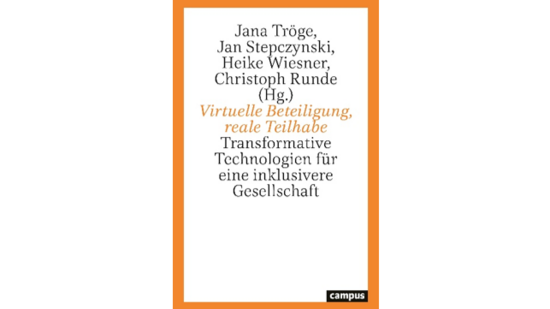
Virtuelle Beteiligung, reale Teilhabe. Transformative Technologien für eine inklusivere Gesellschaft
Virtuelle Realität (VR) und Erweiterte Realität (AR) gehören zu den am schnellsten wachsenden Technologien des 21. Jahrhunderts. Zudem eröffnen sie enorme Möglichkeiten zur Einbindung der Gesellschaft: durch kulturelle und bildungsorientierte Angebote, durch vernetzte digitale Interaktionsräume oder als Mittel zur Förderung der Bürgerbeteiligung. Die Beiträge dieses Bandes präsentieren vielfältige Anwendungsszenarien für VR und AR in den Bereichen Bildung, Gesundheit und öffentlicher Raum. Auf praxisnahe Weise zeigen sie, wie die Gesellschaft, aber auch Unternehmen von der Erweiterung ihrer technologischen Kompetenzen und der Berücksichtigung von Diversitätsaspekten profitieren. Denn echte Teilhabe ist nur durch einen nachhaltigen, transdisziplinären und bürgerwissenschaftlichen Ansatz möglich. Tröge, Jana / Stepczynski, Jan / Wiesner, Heike / Runde, Christoph: Virtuelle Beteiligung, reale Teilhabe. Transformative Technologien für eine inklusivere Gesellschaft, Campus Verlag, Frankfurt/New York, 2025. DOI/ISBN: 10.12907/978-3-593-46260-8

Menopause@work – Handlungsempfehlungen für Unternehmen
Die Hochschule für Wirtschaft und Recht Berlin und BARMER veröffentlichen mit Menopause@work praktische Empfehlungen für Unternehmen zur Unterstützung von Mitarbeiterinnen in den Wechseljahren am Arbeitsplatz. • Praxisleitfaden für Unternehmen: So lassen sich Leistung und Wohlbefinden von Mitarbeiterinnen in den Wechseljahren gezielt fördern • Konkrete Maßnahmen gegen Fachkräftemangel: 40 Millionen Fehltage pro Jahr vermeiden • Entwickelt von Andrea Rumler und der Ko-Autorin Miriam Stein – wissenschaftlich fundiert, mit klarem Anwendungsbezug Die Handlungsempfehlungen gliedern sich in drei zentrale Bereiche: 1. Aufklären: Mehr Wissen für alle Die Unternehmen sollten Wissen über die körperlichen und psychischen Veränderungen in den Wechseljahren vermitteln – und zwar nicht nur an betroffene Frauen, sondern auch an Führungskräfte und Kolleginnen und Kollegen. 2. Kommunikation fördern: Offenes Miteinander ohne Tabus Eine offene, sensibel geführte Kommunikation ist entscheidend. Rund 68 Prozent der befragten Frauen wünschen sich, dass Wechseljahre am Arbeitsplatz kein Tabu mehr sind. Austauschformate oder interne Informationskampagnen können hier wichtige Impulse setzen. 3. Handeln: Vom Reden ins tun – mit konkreten Maßnahmen Von flexiblen Arbeitszeitmodellen über betriebliches Gesundheitsmanagement bis zur Sensibilisierung von Führungskräften – Unternehmen haben viele Möglichkeiten, das Arbeitsumfeld besser auf die Bedürfnisse von Frauen in den Wechseljahren abzustimmen. Rumler, Andrea; Stein, Miriam 2025. Menopause@work - Handlungsempfehlungen für Unternehmen. Hrsg. von der HWR Berlin und der BARMER. Berlin www.barmer.de/menopause-at-work
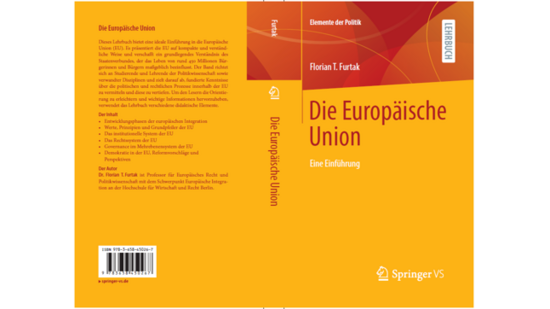
Die Europäische Union. Eine Einführung
Dieses Lehrbuch bietet eine ideale Einführung in die Europäische Union (EU). Es präsentiert die EU auf kompakte und verständliche Weise und verschafft ein grundlegendes Verständnis des Staatenverbundes, der das Leben von rund 450 Millionen Bürgerinnen und Bürgern maßgeblich beeinflusst. Der Band richtet sich an Studierende und Lehrende der Politikwissenschaft sowie verwandter Disziplinen und zielt darauf ab, fundierte Kenntnisse über die politischen und rechtlichen Prozesse innerhalb der EU zu vermitteln und diese zu vertiefen. Um den Lesern die Orientierung zu erleichtern und wichtige Informationen hervorzuheben, verwendet das Lehrbuch verschiedene didaktische Elemente. Der Inhalt • Entwicklungsphasen der europäischen Integration • Werte, Prinzipien und Grundpfeiler der EU • Das institutionelle System der EU • Das Rechtssystem der EU • Governance im Mehrebenensystem der EU • Demokratie in der EU, Reformvorschläge und Perspektiven Furtak, Florian T.: Die Europäische Union. Eine Einführung, Springer VS-Verlag, Wiesbaden 2025. DOI/ISBN:10.1007/978-3-658-45027-4 / 978365845026-7
„Ein Land, das gegen viele unserer christlichen Werte arbeitet“. Analysen zur Berichterstattung von christlich signierten Medien über den Staat Israel im Winter 2023/24
Medial vermittelte Inhalte prägen Bilder vom Staat Israel in Deutschland entscheidend. Journalistische Berichterstattung über ihn und den Nahostkonflikt wurde jedoch seit längerem kaum ausführlicher analysiert. Insbesondere stellt sich die Frage, ob Medienberichte antisemitisch konnotierte und dabei derealisierende Perspektiven aufweisen. Dies ist relevant, da seit einigen Jahren Positionen, die den Staat Israel delegitimieren, ein bedeutendes Argumentationsmuster von Antisemitismus darstellen. Der Artikel untersucht erstmals ein Sample aus vier Medien, deren Berichterstattung sich selbst als christlich versteht. Die ausgewählten 15 Beiträge wurden alle nach dem Massaker der Hamas am 7. Oktober 2023 und bis einschließlich Februar 2024 publiziert. Die Medien wurden bewusst als allgemein gemäßigte, nichtfundamentalistische ausgewählt und verfügen über eine z.T. hohe Reichweite. Die Untersuchung erfolgte als qualitative Inhaltsanalyse. Im Ergebnis zeigt sich, dass offen antisemitische Gehalte im Untersuchungszeitraum in den Texten selten kommuniziert werden. Eine Ausnahme bildet allerdings eine Reportage, die in mehreren Medien aufgegriffen wurde und antijudaistische Stereotype enthält, u. a. werden Israelis als „Kindermörder“ dargestellt. Des Weiteren finden sich im Korpus z.T. gravierende Derealisierungen bei der Darstellung Israels. Sie werden daran erkennbar, dass dezidiert antizionistische Positionen und/ oder Verbindungen zu israelfeindlichen Boykottkampagnen unkommentiert bleiben. Die betroffenen Texte sind Interviews und Reportagen. Die hier repräsentierten Personen sind z.T. Deutsche, teilweise aber auch christliche Palästinenser*innen. Die genannten Phänomene stellen Bruchstellen dar, die christliche Perspektiven für israelfeindliche Deutungen öffnen. Schubert, Kai E., und Ilona Nord. „Ein Land, das gegen viele unserer christlichen Werte arbeitet“. Analysen zur Berichterstattung von christlich signierten Medien über den Staat Israel im Winter 2023/24.“ Zeitschrift für Religion, Gesellschaft und Politik 9 (2025). DOI/ISBN: 10.1007/s41682-025-00216-8.

Handbuch Hochschulrechnungslegung
Wie sind Hochschulabschlüsse zu lesen? Welche Rückstellungen sind in Hochschulen speziell zu passivieren? Wie wirken sich Lehrdeputate auf die Bilanzierung aus? Alles, was für eine zielgerichtete Hochschulrechnungslegung nach dem Prinzip der Doppik wichtig wird, zeigt Ihnen die rundum aktualisierte 2. Auflage des bewährten Handbuchs von Volker Breithecker, Jens Radde und Michael Strotkemper (Hrsg.). Bilanzierungspflicht und Eröffnungsbilanz • Funktionen und Konzepte • Bilanzierung und Jahresabschluss, typische materielle und immaterielle Vermögensgegenstände und Sachverhalte • Analyse von Hochschuljahresabschlüssen, Adressaten und Perspektiven • Besteuerung von Hochschulen und spezifische Anwendungsfelder • Betriebswirtschaftliche Auswirkungen, z. B. auf die Liquidität, Risikomanagement und Compliance oder auch außenwirtschaftsrechtlich Ein einzigartiger Wegweiser, der Sie mit vielen Beispielen bei der Jahresabschlusserstellung und -interpretation unterstützt. Mit Beiträgen von den Herausgebern und Özge Alex, Nicole Burke, Martin Döpper, Michael Girschol, Orcun Güragac, Prof. Dr. Christian Hanke, Prof. Dr. Stefan Heinemann, Dr. André Kaponig, Dr. Matthias Kreysing, Dr. Svenja Kühn, Dr. Alina Leson, Anja Lhotak, Marco Lhotak, Dr. Daniela Schomaker, Jan Strate, Carolin Thomas, Anne Tummes, Dr. Frank Westphal, Andreas F. Wildoer Handbuch Hochschulrechnungslegung, 2. Aufl., Erich Schmidt Verlag, Berlin, 2025 n DOI/ISBN: 978-3-503-13639-1

Werteorientierte Organisationsentwicklung in Polizei und Behörden
Das Buch liefert eine fundierte theoretische Basis zur werteorientierten Organisationsentwicklung • Bietet Lösungen für zukünftige Herausforderungen der Polizei im demografischen Wertewandel • Best-Practice-Ansätze der Berliner Polizei zeigen, wie Wertediskurse in die behördliche Praxis integriert werden können Das Buch beschreibt die Herausforderungen des Generationen- und Wertewandels für Polizei und Behörden sowie die tiefgreifenden Veränderungen für deren Organisation. Mit dem Eintritt junger Menschen in den öffentlichen Dienst geht ein grundlegender Wandel der Arbeitskultur und -strukturen einher. Um diesen Wandel erfolgreich zu gestalten, bedarf es einer kontinuierlichen und werteorientierten Entwicklung hin zu einer lernenden Organisation. Die Bereitschaft von Mitarbeitenden und Führungskräften, bestehende Strukturen in Frage zu stellen und Veränderungsprozesse aktiv mitzugestalten, spielt dabei eine entscheidende Rolle. Wie lässt sich ein offener Diskurs über Werte gestalten und wie können notwendige Veränderungen nachhaltig in die Verwaltungsstrukturen integriert werden? Stephen Köppe stellt die theoretischen Grundlagen einer werteorientierten Organisationsentwicklung vor und zeigt, wie diese im Verwaltungskontext eingeordnet werden können. In einer umfassenden Studie in einer Berliner Polizeidirektion untersuchte er die Haltung von Mitarbeitenden und Führungskräften und nimmt die unterschiedlichen Perspektiven der Generationen auf das Thema in den Blick – von „Babyboomern“ über die Generationen „X“ zu „Y“ und „Z“. Ein praxisnahes Buch für alle, die den Weg zu einer lernenden Organisation in der Polizei und im öffentlichen Dienst aktiv mitgestalten wollen. Köppe, Stephen (2024): Werteorientierte Organisationsentwicklung in Polizei und Behörden, Springer Verlag, Wiesbaden DOI/ISBN: 978-3-658-45651-1

Kommentar BGB-Vertragsrecht: Landpachtverkehrsgesetz
Angesichts weiter steigender Landpachtpreise und einer verstärkten Konkurrenz um landwirtschaftliche Flächen aufgrund der notwendig gewordenen und immer weiter voranschreitenden Umstellung von fossilen auf erneuerbare Energien sind langjährige und sichere Pachtverträge für Landwirte und Landwirtinnen mehr denn je von existenzieller Bedeutung. Die 3. überarbeitete Neuauflage des Kommentars zum Landpachtrecht beschäftigt sich in mehrfacher Hinsicht mit den seit der letzten Auflage stark gewandelten Rahmenbedingungen für Teilnehmer am Landpachtmarkt. Hierzu gehören die mit dem Wegfall der Basisprämienrechte veränderte Rechtslage im Agrarförderrecht und deren Auswirkungen auf die Beziehungen der Vertragsparteien sowie der völlig neu geregelte Rahmen der Vorschriften auf den verschiedenen politischen Ebenen bezüglich der Umwandlung von Ackerland in Grünland und damit einhergehende Auswirkungen der Rechtsprechung zur Höhe des Schadensersatzes in derartigen Fällen. Als Autorin und Autor neu hinzugekommen sind Professorin Dr. Antje G. I. Tölle und Rechtsanwalt Jens Konrad Bohrßen. Kommentar BGB-Vertragsrecht: Landpachtverkehrsgesetz, Berlin 2024 (Agricola-Verlag) DOI/ISBN: 978-3-948248-08-6

Arztstrafrecht
Das Lehrbuch stellt anschaulich den gesamten Bereich des Arztstrafrechts dar, von dessen Kernbestand (u.a. ärztlicher [Heil-]Eingriff als vorsätzliche oder fahrlässige Körperverletzung inklusive der strafrechtlichen Bewertung von SARS-CoV-2-Sachverhalten, Delikte gegen das werdende Leben, die durch die jüngste Rechtsprechung veränderte Sterbehilfedogmatik, Triagekonstellationen, Verletzung der Schweigepflicht) über wirtschaftsstrafrechtliche Einschläge (Abrechnungsbetrug, Korruption im Gesundheitswesen inklusive Compliance im Gesundheitswesen, Vertragsarztuntreue) bis hin zu nebenstrafrechtlichen Bereichen und den strafrechtlichen wie außerstrafrechtlichen Sanktionen bei ärztlichem Fehlverhalten. Zahlreiche Fälle aus der (insbesondere neueren) Rechtsprechung und Schemata fördern das Verständnis für die komplexe Materie. Erik Kraatz, Arztstrafrecht, 3. Auflage, Stuttgart 2023 (Verlag W.Kohlhammer GmbH) DOI/ISBN: 978-3-17-042892-8

Ordnungswidrigkeitenrecht
Das Lehrbuch stellt anschaulich das erforderliche Wissen des Ordnungswidrigkeitenrechts dar, das sich längst in die meisten Rechtsgebiete ausgedehnt und im Schnittpunkt aus Straf- und Verwaltungsrecht eine hohe praktische Bedeutung erlangt hat. Neben den an das Strafrecht angelehnten, sich aber in wesentlichen Aspekten unterscheidenden Allgemeinen Teil und den Rechtsfolgen wird vertieft auf das Verfahrensrecht (behördliches Bußgeldverfahren und gerichtliches Hauptverfahren nach Einspruch) eingegangen. Ein besonderes Augenmerk wird auf die direkte Sanktionierung von juristischen Personen und Personenvereinigungen gelegt. Zahlreiche Fälle aus der Rechtsprechung, die vielfältigen Verwaltungsmaterien entnommen sind, fördern das Verständnis und sorgen dafür, dass das Werk sich sowohl für Studierende, insbesondere höherer Semester (Schwerpunktbereich) als auch insbesondere für Praktiker:innen eignet, sowohl für den ersten Einstieg als auch zur Vertiefung. Die 2. Auflage wurde vollständig überarbeitet und geht u.a. der Frage nach, ob sich juristische Personen und rechtsfähige Personenvereinigungen im Datenschutzrecht durch den Anwendungsvorrang entsprechender DSGVO-Normen ordnungswidrig verhalten können. Erik Kraatz, Ordnungswidrigkeitenrecht, 2. Auflage, Baden-Baden 2023 (Verlag Nomos) DOI/ISBN: 978-3-8487-7432-6

Wirtschaftsstrafrecht
Das Lehrbuch stellt verständlich und kompakt die wichtigsten Themen des Wirtschaftsstrafrechts vor. Zahlreiche Schemata und Fälle aus der Rechtsprechung gewährleisten eine kurzweilige und gezielte Information, die sich auf das Wesentliche konzentriert. Das Werk aus der Reihe Jurakompakt eignet sich damit hervorragend sowohl zur kurzfristigen Wiederholung als auch zur erstmaligen raschen Einarbeitung in die Materie. Erik Kraatz, Wirtschaftsstrafrecht, 3. Auflage, München 2024 (Verlag C.H.Beck) DOI/ISBN: 978-3-406-81299-6

Digitalization and cross-border tax fraud: evidence from e-invoicing in Italy
The digitalization of transaction processes through tools such as electronic invoicing (e-invoicing) aims to improve tax compliance and reduce administrative costs. Another important aspect of digitalization is its potential to reduce tax fraud. We exploit the comprehensive introduction of e-invoicing in Italy in 2019 and examine the effect of increased domestic tax enforcement capabilities on cross-border value-added tax (VAT) fraud. As a proxy for this fraud, we make use of the discrepancy in trade data that are double-reported in both the importing and exporting country (trade data gap, TDG). We calculate the TDG for imports to Italy from all other EU countries at the most detailed product level. Our results suggest a significant decline in cross-border fraud in response to the introduction of mandatory e-invoicing, providing an important rationale for the application of this measure by other countries. Furthermore, we estimate that e-invoicing decreased the Italian VAT loss in 2019 by about € 2.2 billion to € 2.6 billion compared to 2018. In this context, we underpin the suitability of the TDG as an approach for the study of anti-fraud measures. Heinemann, M., Stiller, W. (2024): Digitalization and cross-border tax fraud: evidence from e-invoicing in Italy, International Tax and Public Finance DOI/ISBN: 10.1007/s10797-023-09820-x
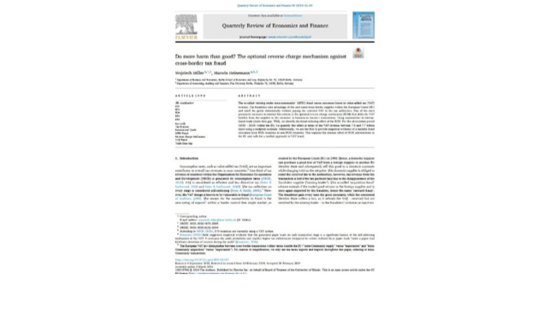
Do more harm than good? The optional reverse charge mechanism against cross-border tax fraud
The so-called ‘missing trader intra-community’ (MTIC) fraud causes enormous losses in value-added tax (VAT) revenue. The fraudsters take advantage of the zero-rated cross-border supplies within the European Union (EU) and resell the goods domestically without paying the received VAT to the tax authorities. One of the most prominent measures to combat this scheme is the optional reverse charge mechanism (RCM) that shifts the VAT liability from the supplier to the customer in business-to-business transactions. Using asymmetries in international trade (trade data gap, TDG), we identify the fraud-reducing effect of the RCM. For the observation period (2003 – 2019) within the EU, we quantify this effect in terms of the VAT revenue between 7.5 and 7.7 billion euros using a midpoint estimate. Additionally, we are the first to provide empirical evidence of a harmful fraud relocation from RCM countries to non-RCM countries. This explains the domino effect of RCM introductions in the EU and calls for a unified approach to VAT fraud. Stiller, W., Heinemann, M. (2024): Do more harm than good? The optional reverse charge mechanism against cross-border tax fraud, Quarterly Review of Economics and Finance, 95, 61–84 DOI/ISBN: 10.1016/j.qref.2024.02.007
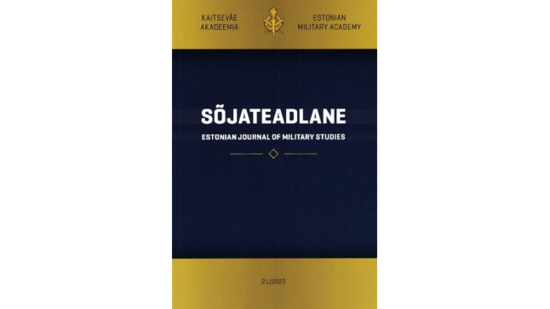
Lethal Autonomous Weapon Systems (LAWS). On the Ethics of Automation in the Military from the Perspective of Social Systems Theory
The debate about weapon systems that function “autonomously” on artificial intelligence is giving a new impetus to the old question about the role of automation in social systems. This is especially true for the debate on Lethal Autonomous Weapon Systems (LAWS), i.e., autonomous systems designed to kill in the context of warlike conflicts. This article provides an insight into how artificial intelligence automation can be modelled in social theory, referring in particular to Niklas Luhmann’s systems and communication theory. From this modelling, conclusions arise with regard to ethical questions in the military context. Spreen, Dierk (2023). Lethal Autonomous Weapon Systems (LAWS). On the Ethics of Automation in the Military from the Perspective of Social Systems Theory. Sõjateadlane (Estonian Journal of Military Studies), 21, 10-40.
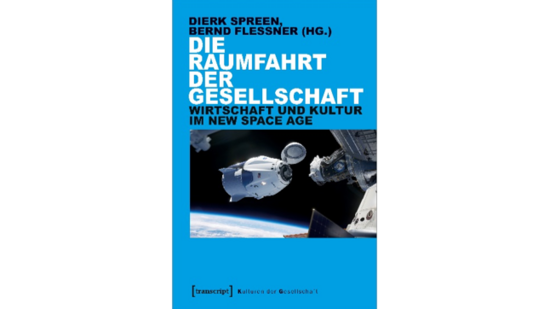
Die Raumfahrt der Gesellschaft – Wirtschaft und Kultur im New Space Age
Alle Menschen sind Astronaut*innen – nachzulesen nicht nur bei Buckminster Fuller, sondern auch bei Michel Serres. Aber was bedeutet es, die Raumfahrt als gesellschaftliches Projekt zu reflektieren? Dieser Frage gehen die Beiträger*innen des Bandes im Hinblick auf die zwei wichtigen Dimensionen Wirtschaft und Kultur nach, die in Verbindung miteinander betrachtet werden. Die Analysen verdeutlichen, wie sich das technische Großprojekt der Raumfahrt in die Gesellschaft eingeschrieben hat, und lassen schlussfolgern, dass die Raumfahrt kein reines Elitenprojekt bleiben kann. Spreen, Dierk, & Flessner, Bernd (Hrsg.). (2022). Die Raumfahrt der Gesellschaft. Wirtschaft und Kultur im New Space Age. Bielefeld: transcript. DOI/ISBN: 10.14361/9783839457627
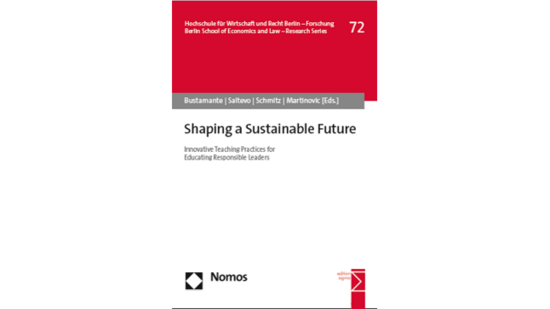
Shaping a Sustainable Future - Innovative Teaching Practices for Educating Responsible Leaders
Education is a key driver for a more sustainable future, most importantly due to its potential for empowering students to make a change and behave responsibly in their role as global citizens and professionals. The need of integrating sustainability, responsibility, and ethics in education is apparent, yet the means for effective implementation are still under development. Supporting educators in designing their own teaching formats is central. With a focus on providing this support, the book delivers insights and inspiration on innovative sustainability- and responsibility-related teaching in the context of higher education. By formulating a suitable framework highlighting the interlinkages of teaching approaches, methods, and competencies, complemented by a collection of best practices, this collective work from educators for educators is an important step on the journey towards a more sustainable education. Bustamante, S., Saltevo, E., Schmitz, M., Martinovic, M. (2022). Shaping a Sustainable Future: Innovative Teaching Practices for Educating Responsible Leaders. Baden-Baden: Nomos. r DOI/ISBN: 978-3-7489-3309-0
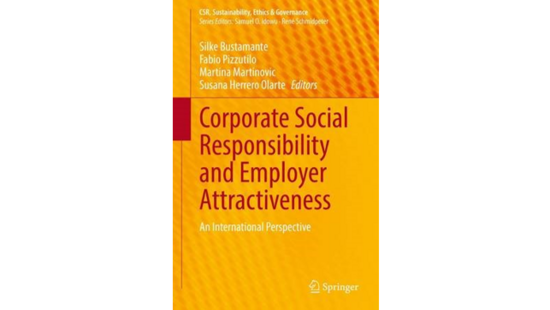
Corporate Social Responsibility and Employer Attractiveness - An International Perspective
This book investigates the preferences of young job seekers for different aspects of corporate social responsibility (CSR) in comparison to other non-CSR related employer attributes. It takes into account the potential influence of cultural and socio-economic variables and provides a differentiated global perspective. In its first part the book gives an overview about the impact of CSR on employer attractiveness and explains the factors that potentially influence CSR preferences of young job seekers all over the world. In a second part the research design is outlined and employer related preferences of 4783 graduates and students coming from 22 countries across the globe are discussed. In the third part, research results are presented for different cultural clusters. The most important criteria for employer choice of respondents are reflected against the socio-economic background and against the characteristics of CSR of the countries in question. Finally, the results are summarized and implications for global employer branding are derived. Bustamante, S., Pizzutilo, F., Martinovic, M., & Herrero Olarte, S. (2021). Corporate Social Responsibility and Employer Attractiveness - An International Perspective. Cham: Springer DOI/ISBN: 978-3-030-68861-5
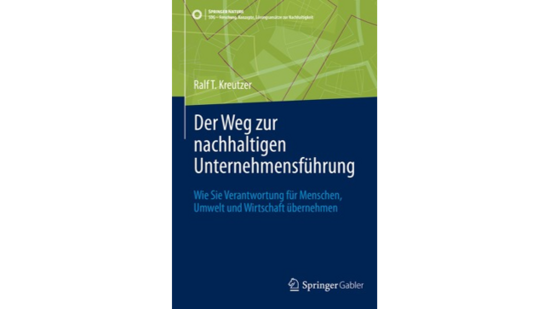
Der Weg zur nachhaltigen Unternehmensführung
Die Welt ist im Umbruch – politisch, gesellschaftlich und hinsichtlich der natürlichen Ressourcen. Immer mehr Menschen und Institutionen legen bei ihren Kaufentscheidungen Kriterien zugrunde, die im weiteren Sinne auf Nachhaltigkeit einzahlen . Um den Anforderungen der Wirtschaft, der Ökologie und des Sozialbereichs (Triple Bottom Line) gerecht zu werden, ist es sinnvoll, das Drei-Säulen-Modell der Nachhaltigkeit im Unternehmen umzusetzen. Gleichzeitig werden u. a. mit dem Lieferkettengesetz weiterführende Erfordernisse definiert und mit den ESG-Kriterien (Environment, Social, Governance) anspruchsvolle Erwartungen auch seitens der Kunden an Unternehmen formuliert. Dieses Werk zeigt auf, wie Unternehmen langfristig souverän auf den Nachhaltigkeitstrend reagieren können, indem die Verantwortlichen im Management – und nicht nur in Marketing und Markenführung – stärker auf diese Herausforderungen eingehen und sich mit den damit verbundenen Implikationen für die Unternehmensführung auseinandersetzen. Ralf T. Kreutzer, Der Weg zur Nachhaltigen Unternehmensführung, Wiesbaden, Springer Gabler, 2023 DOI/ISBN: 978 978-3-658-41050-6

Organisierte Zerrissenheit. Emotionsregimes und Interaktionsarbeit in Pflege und Weiterbildung
Interaktionsarbeit im Bereich personenbezogener (sozialer) Dienste ist von hohem Engagement, aber auch vielen Belastungen geprägt. Inkonsistente wohlfahrtsstaatliche Rahmenbedingungen sorgen systematisch für Spannungen, die das Personal strapazieren und vielfach in Zustände der Zerrissenheit führen. In Fallstudien aus der Altenpflege und der geförderten Weiterbildung demonstrieren die Autor*innen, dass Emotionen hierbei eine kritische Rolle spielen. Sie zeigen zudem, wie diese Zustände darauf einwirken, mit wem sich die Beschäftigten in welcher Weise verbunden fühlen und wie es um deren Widerstandsbereitschaft bestellt ist. Wie die bestehenden Verhältnisse sich ändern ließen, wird anhand sozialpolitischer Alternativen und Veränderungspotenziale durch neue Formen kollektiver Interessenvertretung diskutiert. Betzelt, Sigrid; Bode, Ingo; Parschick, Sarina; Albert, Andreas (2023): Organisierte Zerrissenheit. Emotionsregimes und Interaktionsarbeit in Pflege und Weiterbildung. Bielefeld: Transcript Verlag (Open Access) ISBN: 978-3-8376-6722-6 DOI: 10.14361/9783839467220